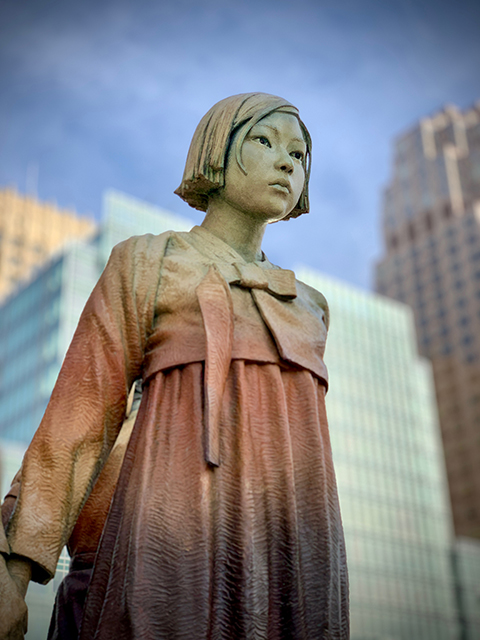CSUN Fellowship to Support Scholarship on Comfort Women

CSUN has established a new scholarship fund to support students and faculty investigating the histories and stories of comfort women during World War II and the 20th century. Photo courtesy of Jinah Kim.
California State University, Northridge officials have established a new scholarship fund to support students and faculty investigating the histories and stories of comfort women during World War II and the 20th century.
The Lee Yong-Soo Comfort Women Human Rights Scholarship Fund will grant as much as $10,000 per year for up to five years to support research and creative activity on women and girls forced into sexual slavery by the Imperial Japanese Army.
The fund was made possible through a gift from an anonymous donor who “recognized the gap between scholarship on the comfort women being produced in the university and its public impact,” said Jinah Kim, a professor of communications studies at CSUN and a scholar of the comfort women experience.
Kim will serve as director of the five-year program, which includes collaborations with San Francisco State University, University of Connecticut, Loyola Marymount University, and Vassar College.
“CSUN was chosen as a fellowship institution because the donor recognized the strengths of our diverse student population and because Cal State students and faculty have such broad public reach,” said Kim. “The donor felt like the issues of comfort women weren’t reaching people’s hearts and minds in an urgent way.”
The fund is named for Lee Yong-Soo, a Korean comfort woman survivor who is on the forefront of fighting for justice for comfort women. Lee is a champion for human rights, and is also working to support women globally who are victims to military violence.
Kim said that, like Lee Yong-Soo, comfort women survivors are in their 90s, and only a few are still alive to receive justice, which includes an official apology from Japan.
Efforts to deny the history of comfort women have been on the rise since 1991, Kim said, when Kim Hak-Sun first publicly testified to her experience as a sexual slave for the Japanese Imperial Army.
“These denialism attempts have gained a toe-hold in the US, including the attempts to erase comfort women history from US textbooks in 2014,” Kim said.
With the Lee Yong-Soo Comfort Women Human Rights Scholarship Fund in place, she said “CSUN will become a center for human rights, poised to contribute to the promotion of meaningful public discourse and scholarship around the comfort women.”

 experience
experience